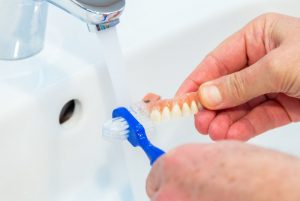
Caring for your gums and dentures are a very important part of your daily routine. Making sure that your device is fitting properly and cleaned is a necessary practice.
- Remove and rinse dentures after eating. Run water over your dentures to remove food debris and other loose particles. You may want to place a towel on the counter or in the sink or put some water in the sink so the dentures won’t break if you drop them.
- Handle your dentures carefully. Be sure you don’t bend or damage the plastic or the clasps when cleaning.
- Clean your mouth after removing your dentures. Use a soft-bristled toothbrush on natural teeth and gauze or a soft toothbrush to clean your tongue, cheeks and roof of your mouth (palate). If used, remove any remaining denture adhesive from your gums.
- Brush your dentures daily. Remove and gently clean your dentures daily. Soak and brush them with a soft-bristled brush and nonabrasive denture cleanser to remove food, plaque and other deposits. If you use denture adhesive, clean the grooves that fit against your gums to remove any remaining adhesive.
- Rinse dentures thoroughly before putting them back in your mouth, especially if using a denture-soaking solution. These solutions can contain harmful chemicals that cause vomiting, pain or burns if swallowed.
- Schedule regular checkups. Your denturist will recommend how often to visit to have your dentures examined and professionally cleaned. Your denturist can help ensure a proper fit to prevent slippage and discomfort, and also check the inside of your mouth to make sure it’s healthy.
- See your denturist if you have a loose fit. See your denturist promptly if your dentures become loose. Loose dentures can cause irritation, sores and infection.

